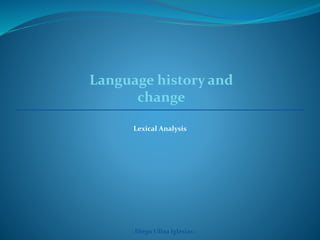
Language history and change
- 1. Language history and change Lexical Analysis - Diego Ulloa Iglesias -
- 2. Language history and change. In 1786, Sir William Jones went on to suggest that a number of languages from very different geographical areas must have some common ancestor. Nowadays, this linguistic investigation carried on two centuries after his suggestion.
- 3. Language history and change. Proto – Indo – European Original Form Europe Indian Sub-continent PIE Language is the unattested, reconstructed common ancestor of the Indo-European languages.
- 4. Language history and change.
- 5. Language history and change.
- 6. Language history and change. Some of the more than 4.000 languages in the world are much more widely spoken than others. 1st.- Chinese : Close to 1 billion speakers. 2nd.- English : About 350 million speakers. 3rd.- Spanish : Close to 300 million speakers. 4th.- Hindi : About 200 million speakers. 5th.- Arabic and Russian : About 150 million speakers each.
- 7. Language history and change. Before starting to recognise the connection of the language family we have to know what a cognate is. It is a word that has a common etymological origin with another one; both from different languages. Sanskrit Latin Greek pitar pater patër (“father”) bhrätar fräter phräter (“brother”)
- 8. Language history and change. All PIE sounds and words are reconstructed from later Indo-European languages using the comparative method. This procedure operates on the basis of some general principles The Majority Principle The Most natural Development Principle If there are further related languages, the sound that occurs most often in the relevant cognates is assumed to be the proto-form. It is based on the fact that certain types of sound-change are very common, whereas others are extremely unlikely.
- 9. Language history and change. * The Majority Principle If three forms begin with a [p] sound and one form begins with a [f] sound, the we guess that the majority have retained the original sound and the minority has changed a little through time. [p] v/s [f] pater (Latin / Italic) father (English / Germanic) pitar (Sanskrit) patér (Greek)
- 10. Language history and change. * The Most natural Development Principle Some rules of this principle are: ↘ Final vowels often disappear ↘ Voiceless sounds become voiced between vowels ↘ Stops become fricatives (under certain conditions) ↘ Consonants become voiceless at the end of words Italian L. Spanish L. French L. cavallo caballo cheval (horse) cantare cantar chanter (sing) [k] sounds [š] sound According to this principle, changes tend to occur in the direction of stops becoming fricatives, so the [k] is more likely to have been the original.
- 11. Language history and change. Language change The historical development of English is usually divided into three major periods. ↘ Old English 7th century – 11th century. ↘ Middle English 1.100 – 1.500 ↘ Modern English From 1.500 to the present.
- 12. Language history and change. * Old English ↘ Variety due to influence of different tribes as Angles, Saxons and Jutes. mann (man) - cild (child) - hüs (house) ↘ Variety due to Christian convertion (Latin influence). angel – bishop – cande – church – priest – school ↘ Variety due to Viking invasion. give - law - skin - sky - take - they
- 13. Language history and change. * Middle English ↘ Influence of new language (French) brought by the Normans. army - court - defense - faith - prison - tax ↘ Variety in pronunciation terms, for example: The diphthong /ei/ is spelled "ei", "ey", "ay" or "ai", and sounds a bit like "whey": they, day. Both Old and Middle English aspects just mentioned are examples of external change in language.
- 14. Language history and change. Sound changes. - Quality of the vowels sounds: Old English Modern English spo:n spu:n (spoon) wi:f wayf (wife) - Some sounds disappeared: Old English Modern English nicht [nixt] nayt (night) - Reversal in position of two adjoining sounds (metathesis): Old English Modern English frist first hros horse Latin Spanish crocodilus Cocodrilo (crocodile) Algeria Argelia (Algeria)
- 15. Language history and change. - Addition of a sound to the middle of a word (espenthesis): - Addition of a sound to the beginning of a word (espenthesis): turum arithametic trump arithmetic status (Latin) estado (Spanish) (state) spiritus (Latin) espíritu (Spanish) (spirit) * ESL learners often add a vowel sound to the beginning of some English words, such as: espeak (speak), eschool (school), Espanish (Spanish).
- 16. Language history and change. Syntactic changes. Word order. • Old English: Subject + Verb + Object Verb + Subject Subject + Object + Verb • Modern English: Subject + Verb + Object Inflection. Nouns, adjectives, articles and pronouns lost many inflectional affixes and took different inflectional forms.
- 17. Language history and change. Lexical changes. * Borrwing. Many words that Old English borrowed from other languages (mainly Latin and Greek) have ceased to be used. Broadening Narrowing The range of meanings associated with a word becomes more… …general than at the beginning of its use. …restricted than at the beginning of its use. Example: Example: “cool”, Old English: a part of professional jargon of Jazz. “cool”, Modern English: (almost) anything conceivable. “mete”, Old English: any solid consumable food. “meat”, Modern English: edible animal flesh. * Broadening and Narrowing.
- 18. Language history and change. The process of change. There is an unending process whereby each language-user has to ‘recreate’ for him/herself the language of the community: each new generation has to find a way of using the language of the previous generation. Diachronically: change of the language through time. Synchronically: change of the language in different places at the same time.
